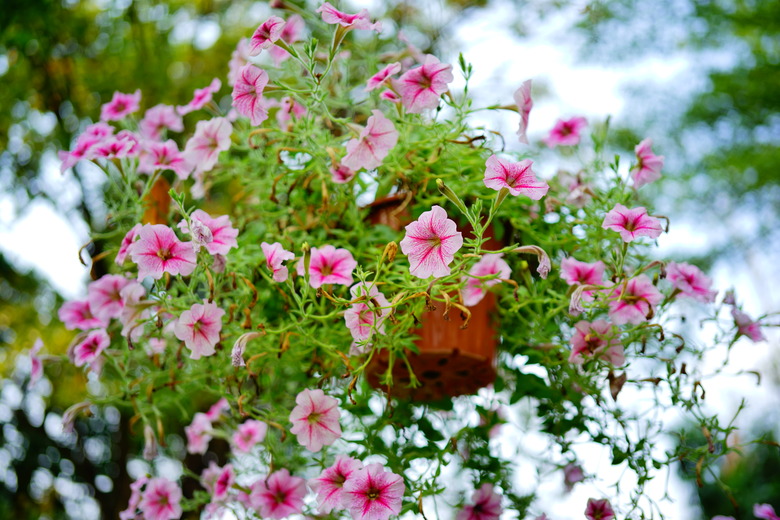Do Deer Eat Petunias?
One day your garden petunias (Petunia x hybrida, USDA zones 10-11) look healthy and vibrant, and the next day, they appear raggedy, shredded and broken. What kind of creature caused such destruction? Although it's hard to be sure without catching the perpetrator red-handed, deer do eat petunias and are large enough to cause immense damage in a single night. Several techniques will allow you to protect your petunias from deer and other critters.
Tip
Deer eat petunias, and so do several other animals and bugs.
Creatures That Eat Petunias
If you've ever seen deer in your yard, chances are they've eaten your petunias. They will eat both the foliage (especially new growth) and the buds, preventing the petunias from flowering, and the flowers, making them look disheveled.
Other wildlife have also been known to eat petunias, including rabbits, mice and squirrels, which seem to love eating the blossoms. If you live on a farm, you might also see chickens and mules sampling your petunias as well. Each animal will require a unique deterrent since what works for one won't necessarily work for another.
Petunias also attract their fair share of invertebrate pests, including aphids, whiteflies, slugs, tobacco budworms and variegated cutworms. Each of these can be difficult to find on your petunias since they tend to feast at night when the weather is cooler. Examine the underside of leaves, the base of the plant, the stem and the buds themselves for signs of these pests before you wage war against deer just in case you've blamed the wrong suspect.
Preventing Deer From Eating Petunias
If you're sure deer are eating your petunias, you can set up a few simple deterrents. As prey animals, deer are highly suspicious of new things, especially things that move. Set up motion-activated sprinklers, lights or alarms near your petunias to scare away deer or place windmills, balloons and scarecrows in the yard. Switch up your scare tactics in case the deer get used to your deterrents.
Deer also prefer to hang around in areas that provide cover, especially for their young fawns. Clear away weeds and tall grasses growing near your petunias to encourage deer to keep moving. This will also discourage mice and rabbits from hanging out around your petunias.
Another way to keep deer out of the garden is to fence it off. Because deer are great jumpers, a physical fence needs to be at least 8 feet high. You can also fence your petunias with a barrier of fragrant plants that will hide the smell of petunias. For example, herbs like mint (Mentha spp.), rosemary (Salvia rosmarinus, USDA zones 7-11), lemon thyme (Thymus x citriodorus, zones 5-8), lavender (Lavandula spp., zones 5-8) and garlic (Allium sativum, zones 5-9) produce strong scents but aren't attractive to deer.
Deer-Resistant Alternatives to Petunias
If you just can't stop your petunias from being eaten, it might be time to call a truce and plant a deer-resistant alternative. Although hungry deer will eat almost any plant, some plants aren't as attractive to them. If you want to grow flowers similar to petunias that are less prone to damage by deer, try planting million bells (Calibrachoa x hybrida, zones 7-11), annual marigolds (Tagetes spp.), and snapdragons (Antirrhinum majus, zones 7-10), which deer seldom eat. Perennial options include bleeding hearts (Lamprocapnos spectabilis, zones 2-9), and lenten rose (Helleborus spp., zones 3-9, depending on species).
